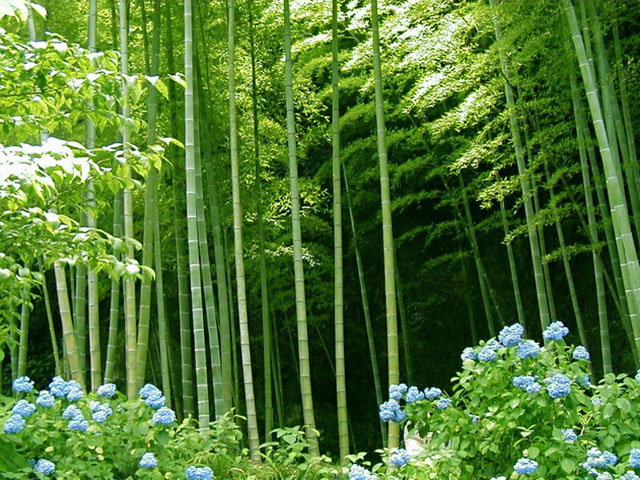
Labeled “the new silk” by some for its incredibly soft texture, bamboo fabric is the center of a great debate over whether the fabric is truly eco-friendly or not. Though it is lauded by many for growing without pesticides at an average rate of 12 inches a day, eco fashion fans are concerned by the harsh chemicals it takes to break down this hardy miracle plant. As more stunning bamboo designs hit the runways, Greenloop thought it was high time to get some answers to this controversy and what we ended up with was a lot more questions.
Industry insider Bruce Dear, owner of Pure Bamboo, was featured recently on White Apricot explaining how his particular company deals with this process.
Some companies, such as ours, produce bamboo fiber via what’s called an advanced “closed loop” solvent spinning process, which has minimal impact on the environment and an economical use of energy and water. The solvent is continually recycled during the production process. So, production plant emissions into the air from smokestacks and from waste water are significantly lower in comparison to many other man-made fiber operations. The solvent to digest the bamboo pulp can be toxic, but utilizing the closed loop process, this solvent is carefully reused and not thrown into local water systems. It’s also important to note that products made from bamboo can be recycled, incinerated or digested in sewage. The fiber will usually degrade completely in just eight days in waste treatment plants.
Thorough investigations by the folks at the Organic Clothing blog yielded an opposing viewpoint…
Bamboo clothing marketers have found a variety of ways to put the most eco-friendly and sustainable face on the manufacturing of bamboo fabric. The dominant manufacturing process of hydrolysis alkalization and multi-phase bleaching is generally referred to as a rather benign process utilizing caustic soda and bleach. The chemicals used are known to create a variety of health problems and neural disorders which can be hazardous to the health of fiber manufacturing workers. If the manufacturing facility lacks adequate pollution control systems – all too common in developing countries where regulations and enforcement are nearly non-existent – then these toxic chemicals can escape into the atmosphere through air vents and smokestacks and into waterways through inadequately treated waste water disposal systems.
Eco news reporter Victoria Everman also expressed concerns about the fabric at GreenLivingOnline…
Seeing bamboo as a “greener” substitute for silk, many designers are clamoring to use it in their collection, including couture and everyday brands. This high demand has forced Chinese manufacturers to begin clearing out natural forests in order to plant more fast-growing bamboo. On top of this, many cultivators are starting to use fertilizers that wouldn’t meet U.S. organic standards in order to increase the yield of their plantations. Additional weeding and tilling of the land in turn leads to increased soil erosion in these areas. Last but not least, China is currently the only manufacturer of bamboo fabric, making it impossible to look for an alternative, local source for this textile. While bamboo can be easily grown in many areas, there are no factories in North America that have the machines to chemically manufacture bamboo fibres.
With all these concerns, there are still so many benefits to consider. Bamboo fabric is completely biodegradable and grown without pesticides. The plants absorb carbon dioxide at a five times the rate of trees, and the extensive root systems prevent soil erosion while retaining water in the watershed. The potential for this fabric is undeniable, though the jury is still out on the current modes of manufacturing. Let’s keep this conversation going in the fashion community with our favorite eco retailers and bamboo clothing producers. The ultimate solution to the bamboo conundrum is within our reach. Best said in the words of famous Chinese philosopher Lao-Tzu…
People in their handlings of affairs often fail when they are about to succeed. If one remains as careful at the end as he was at the beginning, there will be no failure. |
